Science and Engineering
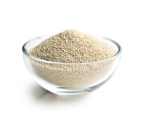 New drug and enzyme class found to have anti-ageing properties
New drug and enzyme class found to have anti-ageing properties 21 October 2025
Researchers from Queen Mary University of London’s School of Biological and Behavioural Sciences, using the simple fission yeast as a model, have shown that new TOR inhibitor rapalink-1 prolongs chronological lifespan.
 AI-generated voices now indistinguishable from real human voices
AI-generated voices now indistinguishable from real human voices 21 October 2025
New study reveals that the average listener can no longer distinguish between deepfake voices and those of real human beings
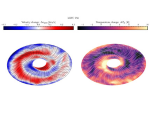 Queen Mary-led team discovers warped planetary nurseries
Queen Mary-led team discovers warped planetary nurseries27 August 2025
New ALMA observations reveal that the discs where planets form are often slightly warped, challenging long-held assumptions and offering clues about the subtle misalignments seen in our own Solar System,
 People with sensitive personalities more likely to experience mental health problems
People with sensitive personalities more likely to experience mental health problems18 August 2025
First ever systematic review and meta-analysis of its kind shows highly sensitive people are more likely to experience mental health problems.
 Queen Mary researcher awarded prestigious Simons Foundation grant for black hole research
Queen Mary researcher awarded prestigious Simons Foundation grant for black hole research 12 August 2025
Queen Mary University of London is set to play a pivotal role in a groundbreaking international collaboration aimed at unravelling the mysteries of black holes and strong gravity, thanks to a significant grant from the Simons Foundation.
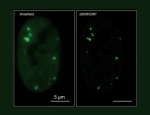 UK researchers unveil innovative super-resolution imaging method for gentle live-cell imaging
UK researchers unveil innovative super-resolution imaging method for gentle live-cell imaging 4 August 2025
Scientists at the Centre for Cell Dynamics, School of Biological and Behavioural Sciences, Queen Mary University of London, in collaboration with Carl Zeiss, have developed an innovative live-cell imaging technique that combines an exceptional resolution of 60 nanometres with fluorescence recovery after photobleaching, while significantly reducing light-induced cellular damage.
 Flies like it cool: study reveals evolutionary shifts in temperature preference among Drosophila larvae
Flies like it cool: study reveals evolutionary shifts in temperature preference among Drosophila larvae18 July 2025
Humble fruit fly has evolved to feel at home in very different temperatures simply by adjusting its behavioural preferences.
.jpg) Pioneering space probe reveals secrets of mysterious solar barrier
Pioneering space probe reveals secrets of mysterious solar barrier8 July 2025
New research utilising data from NASA’s Parker Solar Probe has provided the first direct evidence of a phenomenon known as the “helicity barrier” in the solar wind. This discovery, published in Physical Review X by Queen Mary University of London researchers, offers a significant step towards understanding two long-standing mysteries: how the Sun’s atmosphere is heated to millions of degrees and how the supersonic solar wind is generated.
 Smaller islands offer crucial refuge for endangered mammals in Wallacea
Smaller islands offer crucial refuge for endangered mammals in Wallacea30 June 2025
Research shows smaller islands could hold the key to long-term survival of Indonesia’s rare mammals
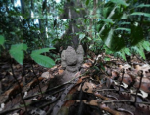 Old termite mounds help support high insect biodiversity in tropical rainforests
Old termite mounds help support high insect biodiversity in tropical rainforests 27 June 2025
Abandoned termite mounds are a newly discovered microhabitat for diverse insect groups in both undisturbed rainforest and areas that have been logged in the past.
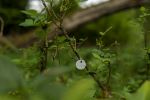 British ash woodland is evolving resistance to ash dieback
British ash woodland is evolving resistance to ash dieback 27 June 2025
New research indicates that natural selection is working to combat ash dieback, a fungal disease that has devastated ash trees across Europe.
 Caffeine could slow cellular ageing: new research shows how
Caffeine could slow cellular ageing: new research shows how25 June 2025
A new study from the Cellular Ageing and Senescence laboratory at Queen Mary University of London’s Centre for Molecular Cell Biology, reveals how caffeine —the world’s most popular neuroactive compound—might do more than just wake you up. The study in the journal Microbial Cell shows how caffeine could play a role in slowing down the ageing process at a cellular level.
 ADHD link to severe premenstrual disorder uncovered in women
ADHD link to severe premenstrual disorder uncovered in women23 June 2025
New study reveals women with ADHD are significantly more likely to suffer from PMDD, highlighting a critical overlooked health risk.
 Scientists find new way to predict how bowel cancer drugs will stop working – paving the way for smarter treatments
Scientists find new way to predict how bowel cancer drugs will stop working – paving the way for smarter treatments20 June 2025
Scientists have developed a tool that can predict how bowel cancer adapts to treatment – helping researchers to design new personalised drugs that will keep patients living well for longer.
 Professor Andrew Livingston celebrated for double honours in chemical engineering
Professor Andrew Livingston celebrated for double honours in chemical engineering20 June 2025
A remarkable week for Professor Andrew Livingston saw him recognised with two significant accolades: a prestigious Lifetime Achievement Award from the World Chemical Engineering Council (WCEC) on Thursday, 19th June, and a substantial grant from UKRI's Engineering and Physical Sciences Research Council (EPSRC) announced today, 20th June.
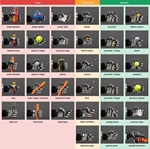 Robotic hand with human-like touch set to revolutionise dexterous manipulation
Robotic hand with human-like touch set to revolutionise dexterous manipulation9 June 2025
New study introduces the F-TAC Hand, a biomimetic robotic hand with unprecedented tactile sensitivity, revolutionising dexterous manipulation in dynamic environments
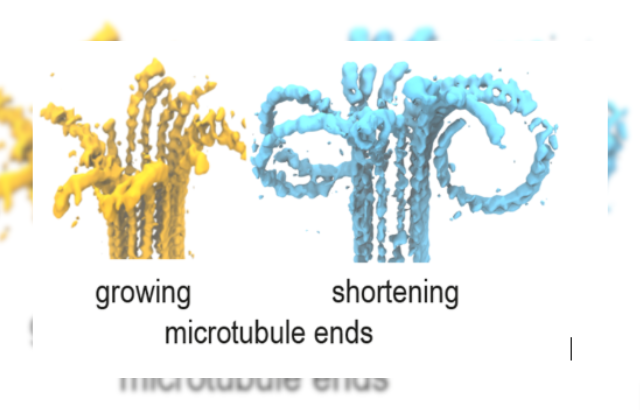 Cellular scaffolding secrets unlocked: scientists discover key to microtubule growth
Cellular scaffolding secrets unlocked: scientists discover key to microtubule growth30 May 2025
Scientists found out how naturally unstable filaments decide whether to grow or to shorten.
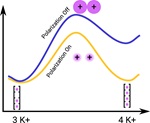 Electrophysiology at atomic resolution: scientists simulate ion channel currents with unprecedented
Electrophysiology at atomic resolution: scientists simulate ion channel currents with unprecedented21 May 2025
Breakthrough study reveals how potassium ions flow through channels in cells – with implications for drug development and understanding neural signalling
 Light-to-electricity nanodevice reveals how Earth’s oldest surviving cyanobacteria worked
Light-to-electricity nanodevice reveals how Earth’s oldest surviving cyanobacteria worked16 May 2025
Atomic-level snapshot of a 3-billion-year-old photosynthetic assembly shows life nailed the design early.
 New insights into black hole scattering and gravitational waves unveiled
New insights into black hole scattering and gravitational waves unveiled15 May 2025
A landmark study published in Nature has established a new benchmark in modelling the universe’s most extreme events: the collisions of black holes and neutron stars.
 Queen Mary scientists achieve micro-scale breakthrough with big promise
Queen Mary scientists achieve micro-scale breakthrough with big promise13 May 2025
New techniques to mimic the complexity of living human organs provide an alternative to using animals in science
 Queen Mary University of London to play key role in new UK Multidisciplinary Centre for Neuromorphic Computing
Queen Mary University of London to play key role in new UK Multidisciplinary Centre for Neuromorphic Computing8 May 2025
A new national initiative to pioneer brain-inspired, energy-efficient computing technologies has been launched, with Queen Mary University of London playing a crucial role alongside other leading UK institutions.
--by-Pinglabel-small.jpg) Atom-thin semiconductors could cut energy use by over 90%
Atom-thin semiconductors could cut energy use by over 90% 29 April 2025
A team of UK scientists at Queen Mary University of London, University of Nottingham and University of Glasgow has received a £6 million EPSRC programme grant, “Enabling Net Zero and the AI Revolution with Ultra-Low Energy 2D Materials and Devices (NEED2D).” This will develop energy efficient, atomically-thin semiconductors to dramatically reduce the electricity demand from AI data centres and high-performance computing.
 A vast molecular cloud, long invisible, is discovered near the solar system
A vast molecular cloud, long invisible, is discovered near the solar system28 April 2025
An international team uncovers a hidden celestial structure using innovative far-ultraviolet techniques.
 New study reveals critical gaps in insect biodiversity research
New study reveals critical gaps in insect biodiversity research4 April 2025
Researchers propose a unified framework to monitor and protect insect biodiversity amid growing concerns over global declines
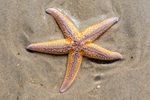 Biologists discover ancient neurohormone that controls appetite
Biologists discover ancient neurohormone that controls appetite25 March 2025
A team of biologists at Queen Mary University of London has discovered that a neurohormone controlling appetite in humans has an ancient evolutionary origin, dating back over half a billion years.
 Climate change fuelling mental health crisis in areas most affected by climate crisis
Climate change fuelling mental health crisis in areas most affected by climate crisis18 March 2025
Young people in southern Madagascar are facing a mental health crisis driven by the devastating impacts of climate change.
 UK-led breakthrough offers path to stable, low-cost solar hydrogen production
UK-led breakthrough offers path to stable, low-cost solar hydrogen production18 March 2025
A collaborative team of researchers from Imperial College London and Queen Mary University of London has achieved a significant milestone in sustainable energy technology, as detailed in their latest publication in Nature Energy.
 What do pesticides do to bumble bee brains over time?
What do pesticides do to bumble bee brains over time?12 March 2025
New research reveals how pesticide dose and exposure time shape effects on bumble bee brains.
 The quest for room-temperature superconductors
The quest for room-temperature superconductors5 March 2025
In a new development that could help redefine the future of technology, a team of physicists has uncovered a fundamental insight into the upper limit of superconducting temperature.